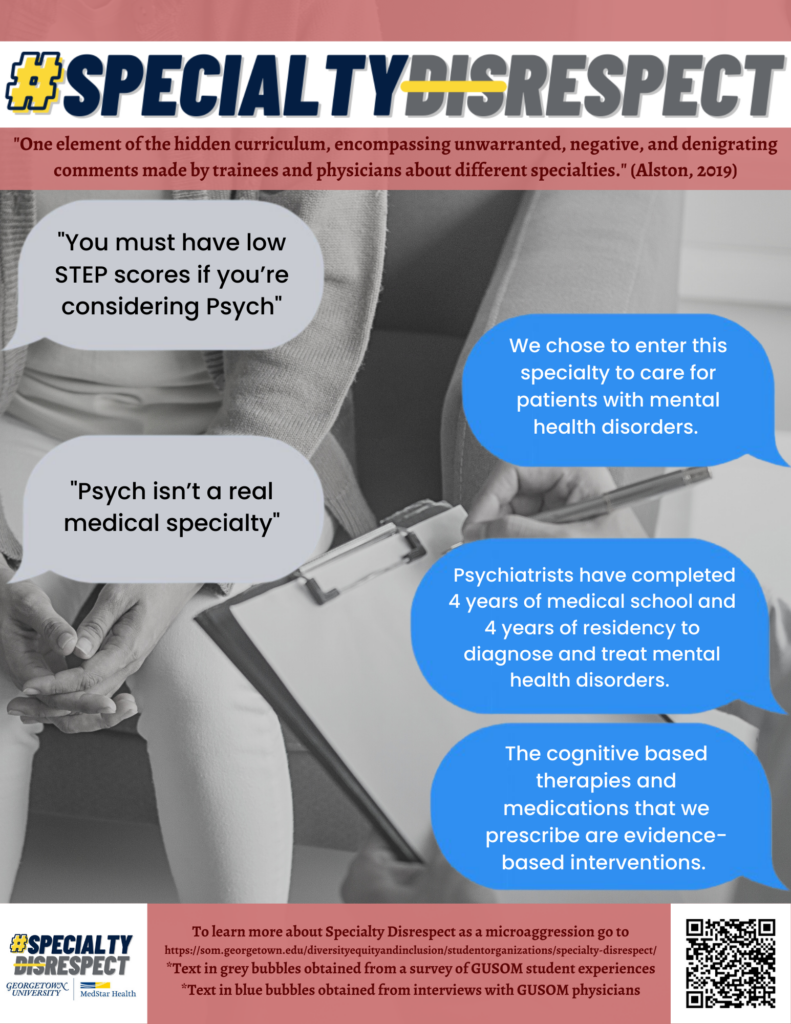Psychiatry

Fiction #1: Psychiatry is boring
FACT: A psychiatrist’s career is full of diversity and flexibility. Psychiatrists can work in many different settings, including private practice, general and psychiatric hospitals, residential treatment centers for teens, jails and prisons, eating disorder treatment centers, nursing homes, military settings, schools and universities, hospice, and many other places. [1]
Additionally, there are many different types of psychiatrists: forensic psychiatrists evaluate accused persons and function as expert witnesses in court, community psychiatrists work with teams of case managers to provide mental health care for the homeless and underprivileged, geriatric psychiatrists evaluate and treat late-life psychiatric syndromes, and researchers work for academic or private organizations creating and disseminating knowledge. [2]
Fiction #2: Psychiatrists are not real doctors
FACT: Psychiatrists provide a wide range of biological, psychotherapeutic, and psychosocial treatments that are tailored to the specific needs of the patient. Psychiatrists can perform both psychological and laboratory tests. This range allows psychiatrists to develop a more holistic picture of a patient’s mental state, enabling them to make an accurate diagnosis and develop an impactful treatment plan. [1] Additionally, advances in neuroscience are creating breakthroughs in our understanding of mood, cognition, and behavior. Tools like neuroimaging are helping to illuminate brain pathways and validate treatments, including psychotherapies. [1]
Fiction #3: Psychiatry is a dying field
FACT: Psychiatry is far from a dying field. In fact, the Bureau of Labor Statistics reports that job opportunities in psychiatry will likely grow by 16 percent from 2018 to 2028. Additionally, the COVID-19 pandemic has and will have a huge impact on mental health. This will result in an increase in mental health services and necessitates a strengthening of preventive approaches and policies for mental health. [3]
Sources
1. What Is Psychiatry? https://www.psychiatry.org/patients-families/what-is-psychiatry-menu. Published 2021. Accessed May 3, 2021.
2. García-Gutiérrez, M. S., Navarrete, F., Sala, F., Gasparyan, A., Austrich-Olivares, A., & Manzanares, J. (2020). Biomarkers in psychiatry: concept, definition, types and relevance to the clinical reality. Frontiers in psychiatry, 11, 432.
3. Pacchiarotti I, Anmella G, Fico G, Verdolini N, Vieta E. A psychiatrist’s perspective from a COVID-19 epicentre: a personal account. BJPsych Open. 2020;6(5):e108. Published 2020 Sep 9. doi:10.1192/bjo.2020.83
Read text version of this poster
[Background is in black and white and is a patient talking and physician taking notes on clipboard]
[Top header in red. Text in navy]
“Specialty Disrespect” in bold at the top. Underneath this title reads “Specialty Disrespect (SD) is an element of the hidden curriculum, encompassing unwarranted, negative, and denigrating comments made by trainees and physicians about different specialties. SD affects all specialties, touching most medical students by graduation (Alston, 2019).”
Poster that mimics an iphone messaging screen with fictional statements as receiving grey message bubbles and factual statements as sent blue message bubbles. This poster is about Psychiatry. The fictional side reads “”You must have low STEP scores if you’re considering Psych” and the factual response reads “We chose to enter this specialty to care for patients with mental health disorders.” The next fictional response reads “psych isn’t a real medical specialty” and the factual response reads “Psychiatrists have completed 4 years of medical school and 4 years of residency to diagnose and treat mental health disorders.” and “the cognitive based therapies and medications that we prescribe are evidence-based interventions”
[Bottom header in red. Text in navy]
On the left is the dark blue Office of Diversity and Inclusion Logo. On the right is a QR code that links to this webpage (som.georgetown.edu/specialty-respect). In the middle is “To learn more about SD as a microaggression go to som.georgetown.edu/specialty-respect”
